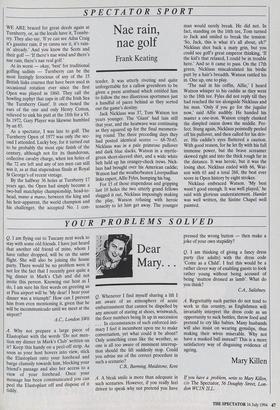SPECTATOR SPORT
WE ARE braced for great deeds again at Turnberry, or, as the locals have it, Tonnbr- rry. They also say, 'If ye can see Ailsa Craig Ifs gaunter rain; if ye canna see it, it's rain- in' already.' And you know the Scots and their golf — 'If there's nae wind and there's nae rain, there's nae real golf.'
At its worst — okay, 'best' for traditional golfing sadists — Turnberry can be the most fizzingly ferocious of any of the 15 British links courses that have been used in occasional rotation ever since the first Open was played in 1860. They call the howling zephyr that zaps in off the Irish Sea 'the Turnberry Giant'. It once boxed the ears of the one and only Henry Cotton, relieved to sink his putt at the 18th for a 93. In 1972, Gary Player was likewise humbled by an 85.
As a spectator, I was late to golf. The Turnberry Open of 1977 was only the sec- ond I attended. Lucky boy, for it turned out to be probably the most epic finish of the century, although not for its thunderous, collective cavalry charge, when ten holes of the 72 are left and any of ten men can still win it, as at that stupendous finale at Royal St George's of recent vintage.
By the halfway 36 holes at Tumberry 17 years ago, the Open had simply become a two-ball matchplay championship, head-to- head, mano a mano, between the king and his heir-apparent, the world champion and his challenger, the accepted No. 1 con-
Nae rain, nae golf
Frank Keating
tender. It was utterly riveting and quite unforgettable for a callow greenhorn to be given a press armband which entitled him to follow the two illustrious sportsmen just a handful of paces behind as they sorted out the game's destiny. Jack Nicklaus was 37, Tom Watson ten years younger. The 'Giant' had lain still that year, and the heatwave was continuing as they squared up for the final mesmeris- ing round. The three preceding days they had posted identical scores — 68-70-65. Nicklaus was in a pale primrose pullover and dark blue slacks, Watson in a myrtle- green short-sleeved shirt, and a wide white belt held up his orangey-check trews. Nick- laus had brought over his American caddie; Watson had the weatherbeaten Liverpudlian links expert, Alfie Fyles, humping his bag.
For 15 of those stupendous and gripping last 18 holes the two utterly grand fellows slugged it out, Nicklaus imposingly making the play, Watson refusing with heroic tenacity to let him get away. The younger man would surely break. He did not. In fact, standing on the 16th tee, Tom turned to Jack and smiled to break the tension: `So, Jack, this. is what it's all about, eh?' Nicklaus shot back a maty grin, but you could see golfs great emperor thinking, 'If the kid's that relaxed, I could be in trouble here.' And so it came to pass. On the 17th green, Nicklaus miscalculated his birdie putt by a hair's breadth. Watson rattled his in. One up, one to play.
'The nail in his coffin, Alfie,' I heard Watson whisper to his caddie as they went to the 18th tee. Fyles did not reply till they had reached the tee alongside Nicklaus and his man. 'Only if you go for the jugular now,' said Alfie audibly. He handed his master a one-iron. Watson crisply clunked the dimpled onion down the middle. Per- fect. Stung again, Nicklaus pointedly peeled off his pullover, and then called for his driv- er. His caddie's eyes fluttered a caution. With good reason, for he let fly with his full immense power, but the brave screamer skewed right and into the thick rough far in the distance. It was heroic, but it was the losing shot. Nicklaus ended with 66, Wat- son with 65 and a total 268, the best ever score in Open history by eight strokes.
Nicklaus embraced Watson. 'My best wasn't good enough. It was well played,' he said with glorious understatement. Hamlet was well written, the Sistine Chapel well painted.


















































 Previous page
Previous page